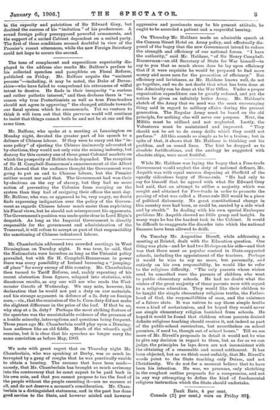On Tuesday Mr. Augustine Birrell, while addressing a meeting at
Bristol, dealt with the Education question. One thing was plain—and h had two Bishops on his side—and that was that there must oe popular control in State-supported schools, including the appointment of the teachers. Perhaps it would be wise to say no more, but personally, and entirely on his own responsibility, he would like to refer to the religious difficulty. "The only parents whose wishes need be consulted were the parents of children who went to public elementary schools. He had no doubt what the wishes of the great majority of those parents were with regard to a religious education. They would like their children to be taught the simple elementary religious truths, the Father- hood of God, the responsibilities of man, and the existence of a future state. It was untrue to say those simple truths were a kind of sectarianism, and he hoped they would never see simple elementary religion banished from schools. He hoped it would be found that children whose parents desired definite religious teaching should receive it, not indeed as part of the public-school curriculum, but nevertheless on school premises, if need be, though out of school hours." Till we see more of Mr. Birrell's proposals in detail it would not be wise to give any decision in regard to them, but as far as we can judge, the principles he lays down are not inconsistent with the obtaining of a reasonable and sound settlement. It has been objected, but as we think most unfairly, that Mr. Birrell's words point to the State teaching only Deism, and not Christianity. We do not for a moment believe that to have been his intention. He was, we presume, only sketching in the roughest outline proposals for a compromise, and not in any way attempting to define the kind of fundamental religious instruction which the State should undertake.


















































 Previous page
Previous page